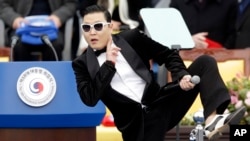SEOUL —
Japan's 'Golden Week' holiday period is about to begin. Normally this is a time for the tourism industry in neighboring South Korea to celebrate. It is a primary destination for vacationing Japanese. But travel reservations indicate a significant downturn this year.
Bookings for Japanese to visit South Korea between this Friday and May 6, are 11 percent lower than last year, according to a survey by the Korea Chamber of Commerce and Industry.
For a decade, the travel industry has enjoyed the fruits of the so-called “hallyu” boom, primarily driven by Japanese fans of South Korean television dramas and pop music groups.
But the industry has seen a steep slide in the number of Japanese visitors since last September, a month after a provocative visit by then-President Lee Myung-bak to a small island held by South Korea, but also claimed by Japan (known as Dokdo in Korean and Takeshima in Japanese).
The Korea Association of Travel Agents says the number of Japanese tourists plunged more than 22 percent during the first quarter of this year.
Territorial disputes
According to Rhee Byung-chan, director of the Japan team at the Korea Tourism Organization, there are several factors for the decline.
Rhee said not only can it be blamed on the lingering territorial spat, but also on the weakening of the Japanese yen and alarming headlines about North Korea.
In recent months, Pyongyang shot into space a long-range rocket and conducted its third nuclear test, before further rattling nerves internationally with stark warnings of imminent war on the Korean peninsula.
Cho Gye-seok, a director of the Korea Association of Travel Agents, said this plunge is being regarded more seriously than the one three years ago when fears about avian influenza scared off 30 percent of Japanese tourists. But, he noted that was a global trend and the numbers bounced back.
Cho explained that some travel agencies have seen a loss of half of their business, forcing them to send their employees on extended vacations or lay off workers.
If this continues, Cho said, it will lead to a collapse of the system tailored for catering to Japanese tourists. Thus, the government is urgently being asked to help.
Enhanced marketing
The industry wants the government to provide funds for enhanced marketing and for organizing promotional events and festivals.
Japan Team Director Rhee at the Korea Tourism Organization said a new advertising campaign is also about to be unveiled to attempt to lure more Japanese back to South Korea.
He said from mid-May the tourism organization will begin airing television commercials in Japan featuring the musician Psy, who is famous for the most-watched online music video --“Gangnam Style”.
The impact from the loss of the Japanese has been somewhat buffered by a rise in the number of inbound Chinese visitors.
During the first quarter of this year, 723,000 Chinese visited South Korea, an increase of 38 percent compared to the same period in 2012.
Industry officials said, unlike the Japanese, visitors from China appear unfazed by the threats from North Korea.
Bookings for Japanese to visit South Korea between this Friday and May 6, are 11 percent lower than last year, according to a survey by the Korea Chamber of Commerce and Industry.
For a decade, the travel industry has enjoyed the fruits of the so-called “hallyu” boom, primarily driven by Japanese fans of South Korean television dramas and pop music groups.
But the industry has seen a steep slide in the number of Japanese visitors since last September, a month after a provocative visit by then-President Lee Myung-bak to a small island held by South Korea, but also claimed by Japan (known as Dokdo in Korean and Takeshima in Japanese).
The Korea Association of Travel Agents says the number of Japanese tourists plunged more than 22 percent during the first quarter of this year.
Territorial disputes
According to Rhee Byung-chan, director of the Japan team at the Korea Tourism Organization, there are several factors for the decline.
Rhee said not only can it be blamed on the lingering territorial spat, but also on the weakening of the Japanese yen and alarming headlines about North Korea.
In recent months, Pyongyang shot into space a long-range rocket and conducted its third nuclear test, before further rattling nerves internationally with stark warnings of imminent war on the Korean peninsula.
Cho Gye-seok, a director of the Korea Association of Travel Agents, said this plunge is being regarded more seriously than the one three years ago when fears about avian influenza scared off 30 percent of Japanese tourists. But, he noted that was a global trend and the numbers bounced back.
Cho explained that some travel agencies have seen a loss of half of their business, forcing them to send their employees on extended vacations or lay off workers.
If this continues, Cho said, it will lead to a collapse of the system tailored for catering to Japanese tourists. Thus, the government is urgently being asked to help.
Enhanced marketing
The industry wants the government to provide funds for enhanced marketing and for organizing promotional events and festivals.
Japan Team Director Rhee at the Korea Tourism Organization said a new advertising campaign is also about to be unveiled to attempt to lure more Japanese back to South Korea.
He said from mid-May the tourism organization will begin airing television commercials in Japan featuring the musician Psy, who is famous for the most-watched online music video --“Gangnam Style”.
The impact from the loss of the Japanese has been somewhat buffered by a rise in the number of inbound Chinese visitors.
During the first quarter of this year, 723,000 Chinese visited South Korea, an increase of 38 percent compared to the same period in 2012.
Industry officials said, unlike the Japanese, visitors from China appear unfazed by the threats from North Korea.










